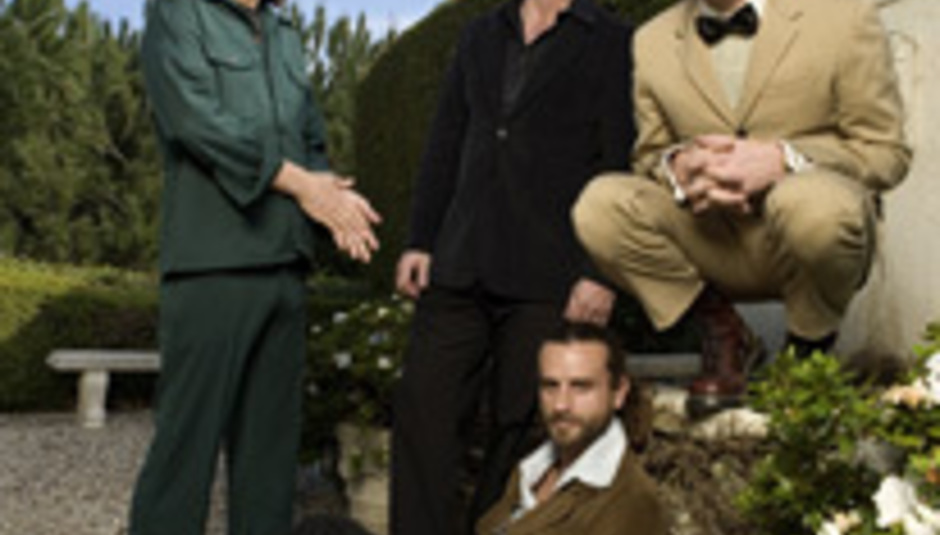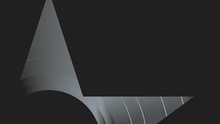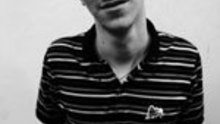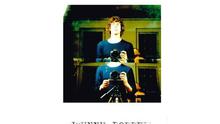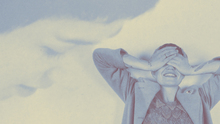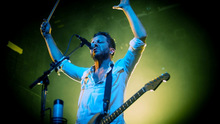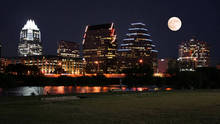Tool might only cough out a new album once every five years or so, but spring 2006 brought us their fifth instalment, 10,000 Days (review). A world tour followed, which brings the four-piece to the UK in all of a few days!
DiS recently had one mighty chin wag with Tool's drummer extraordinaire Danny Carey - the band's completed by Justin Chancellor (bass), Maynard James Keenan (vocals) and Adam Jones (guitar) - and learnt all kinds of stuff about secret hobbies, even more about secret frustrations, and why the band nearly killed each other during the making of their latest long-play disc.
Lateralus was a tight and complex album but now on 10,000 Days the sound has an even greater precision. Is that the result of the band's natural maturing?
Yeah, I think we've got a bit better at our craft and have learnt to get a bit more concise and to weed out extraneous things. It's weird but I thought that this album didn't quite fit together as a larger picture, but that each song was a lot better defined and with more personality to it, so in the end the whole record has a heavier vibe because of it being a collection of all those pieces.
The pivotal twin tracks, 'Wings For Marie' and '10,000 Days', concern the death of Maynard James Keenan's mother, some ten-thousand days (or twenty-seven years) after a stroke left her paralysed. Was the writing of the whole album coloured by Maynard's presumed conflicting emotions of relief and grief?
Well, no more for him than the rest of us, I suppose. With that particular tune, I know he had to go through the fire a bit more. It was definitely a very heavy personal thing for him, but each of us had particular songs that were the most cathartic to us. As a band, I suppose that one came together a little easier for us than some of the others. We didn't nearly break up over that one like we did for 'The Pot' (track five on said album). A lot heavier battle ensued over that tune than any other but for 'Wings For Marie', the music and even Maynard's lyrics just seemed to fall into place easily.
I'm curious now. What on happened when you were writing 'The Pot'?
Oh, it's just that our work ethics differ, I suppose. Maynard's definitely a person who relies on a flash of inspiration. No-one ever wants to second-guess him because he convicts right away, whereas Adam just wants to try every possibility over and over again. With 'The Pot', Adam knew that the very first thing we tried really was a flash of inspiration but he was not going to let it go until he'd tried every conceivable way of doing things, so by the end of it we really were ready to kill him. But when we're really ready to try something out, then we want to kill Maynard because he gets frustrated and doesn't want to keep working. And of course, we think Maynard's lazy and we think Adam's a slave-driver and we all get close to death. It all falls somewhere in the middle ground where it all makes sense, but it's just so difficult at times. These little idiosyncrasies of our different personalities come out and they drive you crazy, especially after fifteen or sixteen years.
Because of his other commitments with A Perfect Circle, how available to you was Maynard during the early days of making this record?
Oh, he was there throughout the whole process. It was really good. Much more so than when we made Lateralus (released 2001). He had a bit more time as people had been a bit more excited about the first A Perfect Circle record so he was able to put a lot more time into 10,000 Days. Even back when Lateralus came out, he saw the value of Tool compared to his other project, so each time he came to work on this one, he was full-on into it, heart and soul.
With A Perfect Circle I suspect Maynard has to carry the whole weight of the band himself, but there's more of a four-way spread between you guys?
Yeah, I guess I've always liked bands who sound like bands, you know. I just don't think bands can have a longevity when there's one kingpin or one driver telling everyone what to do. You hear that really easily with - even though I love Trent (Reznor)'s music) - Nine Inch Nails. There's always that thing where it's not quite as multifaceted or it doesn't have as many connections to it because you can mainly hear Mr Dictator, whoever he is, and you don't get that crossover. You don't hear all the sacrifices between different personalities being made that can take it to a higher level.
When we do our rehearsals and we have an idea for a song, it's devastating sometimes when you see it being drawn and quartered to end up so far away from where you'd envisioned it. It's just thrown to the wind sometimes, but just by our experience we've learnt that the sacrifices we make always seem to pay off, and the song seems to grow and get bigger than you ever expected. The band is like any other relationship I suppose, and with the sacrifices there is a payoff; having stayed together this long there is a trust that has developed over the years.
When writing the music, do the three of you give any thought to the fact that Maynard is going to come in and sing lyrics to what you compose, or do you accommodate him before he enters the process?
Maynard's involved with the music too, especially on this album - a lot more. He came up with quite a few little melodic ideas and some good arrangement ideas, too. His overall melody and his lyrics come last, although some of his distinctive melodies will come at the same time we are working on the music. We then get know at least what his melodies and phasing will be, because he kind of scats it before he has words and then he kind of fills the words in from there.
Are the rest of the band ever involved in writing lyrics or is that solely Mr Keenan's domain?
He does it pretty much all himself, although he'll come to us if he gets stuck. He'll come and ask us for help on things but we just let him deal with it because he's the one who has to stand up there and be completely convicted in what he is singing.
The album's artwork features a series of vintage-styled photos. For a band who normally prefer anonymity, why have you now chosen to be more apparent?
We thought it would be neat to be a bit more revealing this time as we felt as though we'd got to the point where the music was understood as itself. We had never wanted to be in a position where we were selling ourselves through our artwork, more than the music.
With the four portraits, are the carefully arranged artefacts within the mise en scenes personal emblems?
Yes, we all set up our own photographs and we had the chance to take them in which ever direction we wanted, and to have fun with them.
What did you particularly choose?
Some of my things are Buddhist emblems and from the occult, but I've always been interested in that area and I collect books on it. It was my way of expressing my head-space.
That's really cool, because in line with the 19th century-styled artwork, as well as the contemporaneous stereoscopic photography, people back then used to want their most treasured possessions to appear with them in photos, such as their Bible.
Yeah, we wanted to treat the images like that and for them to have a timeless feel, as though they were really one-hundred-years-old or more. Adam became really fascinated with stereoscopic photography. He's even joined a club here in California where they meet once a month. He took a couple of those cameras out with him when we were on the Lateralus tour and became more and more engrossed, so when the time came to do the artwork he was very happy to do the art direction.
The best way I can describe a Tool gig is as sensory overload. When planning how you want to present a new work on tour, do you follow themes set from when you start to write the album or does it grow?
It grows. We never really have any preconceived ideas. We just come in after taking our little break from each other after the album's been completed and start trying ideas out. We have long jams and then see what develops but there's never really any focus or plan other than exposing ourselves to the chemistry where we all four are. After the record's done, it does tend to take on quite a character and we try to embellish the vibe and feelings get brought out as we work through the whole process on stage, including the lighting, the projections and everything to bring out the dramatics.
On the Lateralus tour, Maynard was back-lit and performed mostly from the rear of the stage. Now he is prominently on the cover art - has this new transparency followed through to the show?
Yup, he's been coming out a little more, even though he's still set up back in my area, but the main point of that is that we really don't want people to focus on one thing. The human voice is such a powerful thing and everybody wants to look at that, but we always wanted to keep him just a little bit darker so people will have to look at the whole show and what's going on with the everything that we bring to it.
With Tool being lauded for their incendiary, imagistic shows, why has there never been a live DVD or even CD?
Well, we really planned on making it during last year but we just ran out of time. At the end of the Lateralus tour we made a big effort, and even video-recorded the last ten shows and audio-recorded the last fifteen, so we have all this material. There is a chance, if we have time, that we are going to start going through it and editing for a live DVD, so I'm hoping that we will have one out.
When I saw you at Brixton Academy on the Lateralus tour, while the stage was being arranged after the support act, a huge cheer went up at the appearance or your drum kit from under a tarp. Do you sometimes feel like the preserver of the art of drums, because fewer drummers these days seem to aspire to much beyond keeping the beat?
D'you know, I've never quite understood that! I would have played a different instrument if I'd had to play like a metronome. For my drumming craft, if anything, I think I've developed more on the last record by being more involved texturally and even harmonically and just being more sensitive to all that was going on musically and really having a conversation with my band mates, rather being there just to keep a beat. But most drummers are quite content, I guess, to be a metronome even though I know a lot of music doesn't call for much more. It's lucky for me that I can express myself however I want, and it's a healthy position for me to be in.
Which drummers have been an inspiration to you?
In the prog world, Bill Bruford (King Crimson, Yes, Bruford). He was always really free thinking about electronic drums and things like that and I always appreciated that a lot, especially at one point when all of a sudden it became so uncool to use electronic drums, but I just thought, 'Ah, man, everyone should do what pleases themselves'. So yes, he was a big influence in that way. Other than him I drew my influences from some of the more jazzier guys like Billy Cobham (John McLaughlin's Mahavishnu Orchestra, Miles Davis) and I loved Steve Gadd's playing too. He made a lot of great records with Chick Corea and Steely Dan. I just loved his drumming.
I remember feeling an immense thrill when I learned that no matter how long a string or cord pulled taut is, if it is segmented half way, the tone you get is exactly one octave higher than if you pluck the open string. How can that perfection be? Is it immutable truths such as this that lie behind the band's adherence to Sacred Geometry (link)?
Yeah, all the vibrations of musical instrument are like that. It's pretty incredible the way the whole tempered scale on a piano, and on string instruments in particular, make it more vivid because you see the ratios. Then you can cut it down further and further to get the overtones and the harmonics in the ratios and the more dissonant it gets you can take it even further until you reach cacophony.
How can you further utilise this harmony of the universe and of music into your ethos, because I hear that there's something specific you do with your drum set-up?
I think it's more about finding a personal harmony, where you can be comfortable with the resonations between your body and finding that place where it fits with your surroundings and trying to be as aware of that as possible. It's such a subjective thing that I don't think there are cut and dried rules as such. You have to find your niche and figure out how hard you want to push that dissonance or what resonates with you and feels natural. I think it can be different for each person but I've always found what feels right for me and then you become aware of the more subtle vibrations. You have to pay attention to them but even then, I'm still not certain if it will make any difference at all. Maybe subliminally though.
To close, would you mind telling me something you've never revealed in an interview before. Pretend we're at a bar or something and just throw something into the wind.
Well, I've always been a bit of a frustrated guitar player but I've never really said that to anyone before! I might be a little bit more frustrated if I didn't keep going out and buying guitars and hoping that their vibrations would rub off on me. It was always something that I was fascinated with, to do with what we were saying about string instruments. When I was going through school, it was all about percussion instruments there and I played the vibes and the timpani so now I'm beginning to get into things with just a little more string. So far I have bought about fifteen of them.
Does Adam help you or is this something that you do by yourself?
I really liked his Les Pauls, so I went out and bought a couple that were like his, then I just started buying my heroes' instruments such as [Yes'] Steve Howe's and one like the guy in Killing Joke. I've been going for different basses too as I used to play a little more bass.
Ha, that's brilliant. So for the next album should we be expecting a bit more...?
Don't expect too much, ha!
Tool's UK tour looks like this:
November
24 Manchester Evening News Arena
25 Glasgow SECC
27 London Wembley Arena
30 Cardiff International Arena
December
1 Nottingham Arena
Added questions and inspiration - Wayne Kessler

